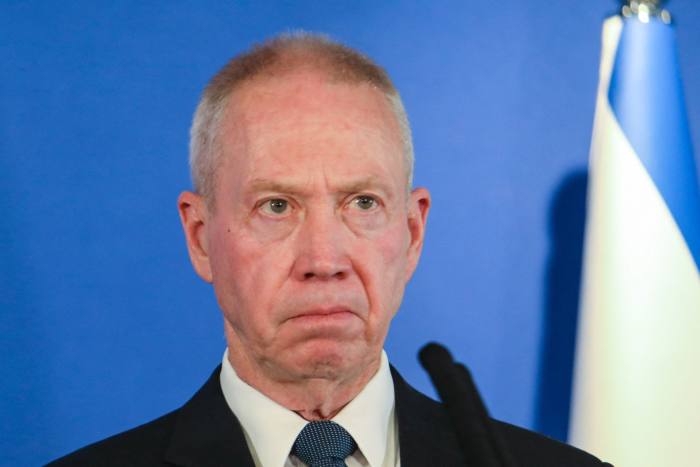[ad_1]
Israel’s prime minister Benjamin Netanyahu has reversed his decision to fire defence minister Yoav Gallant, amid deteriorating security that has left the country battling threats on multiple fronts.
Netanyahu originally said two weeks ago he would sack Gallant after the defence minister spoke out against the government’s controversial plans to weaken the powers of the judiciary. The minister warned that the deep polarisation caused by the proposals was undermining Israeli security.
Netanyahu’s decision sparked mass protests and a shortlived general strike that closed banks, shopping malls and even Israel’s international Ben Gurion airport, forcing Netanyahu to back down and postpone the bulk of the judicial overhaul until the next parliamentary session in May.
But despite announcing Gallant’s firing, Netanyahu never formalised his dismissal. The minister continued to attend official functions and on Monday evening Netanyahu officially reversed course.
“We had disagreements,” he told journalists at a press conference in Tel Aviv. “But I have decided to put the arguments behind us.”

The prime minister’s climbdown follows a week of spiralling tensions touched off by two Israeli police raids on al-Aqsa mosque in Jerusalem to remove Palestinians trying to remain overnight in the hilltop compound.
The site, the third holiest in Islam and the holiest for Jews, who know it as the Temple Mount, is one of the most sensitive places in the Israeli-Palestinian conflict. Clashes there have sparked broader conflicts, including an 11-day war between Israel and militants in Gaza two years ago.
Footage of heavily armed Israeli forces beating Palestinians with rifle butts and batons during the first raid on the mosque sparked outrage in the Arab world, and in the following days, militants in the Gaza Strip, southern Lebanon and Syria all fired rockets at Israel.
Israel responded by bombing sites in all three territories, blaming the rocket fire from Lebanon and Gaza on the Palestinian militant group Hamas.
The cross-border exchanges ended without fatalities. But the situation in Israel and the occupied West Bank has remained highly volatile. On Friday two Israeli sisters were killed after their car came under fire near a Jewish settlement in the occupied West Bank. Their mother, who was also seriously wounded in the attack, succumbed to her injuries on Monday.
Later on Friday, an Italian tourist was killed and five others were injured after a car veered on to a cycle path near the beach in Tel Aviv in what Israeli officials said was a suspected car-ramming.
This violence on several fronts follows a year of mounting tensions in the West Bank, where Israeli forces have killed more than 250 Palestinians, while Palestinians have killed more than 40 Israelis.
The surge in unrest has sparked fears that long-simmering Israeli-Palestinian tensions could be on the verge of spilling over into a wider conflict. It also poses a serious challenge for Netanyahu’s hardline government, in which ultranationalists who have pledged to take a tougher stance against the Palestinians hold several key security posts.
In his speech on Monday evening, Netanyahu blamed deteriorating security on the previous government and on reservists who had threatened not to show up for duty in protest against his judicial overhaul.
“When our enemies see the call for refusal, they interpret it as a weakness in our national resilience,” he said.
Yair Lapid, leader of Yesh Atid, the largest opposition party, rejected Netanyahu’s accusations.
“Instead of . . . blaming others for the troubles caused by his extremist and failed government, the time has come for [Netanyahu] and his ministers to stop whining and finally take responsibility,” he wrote on Twitter.
[ad_2]
Source link
